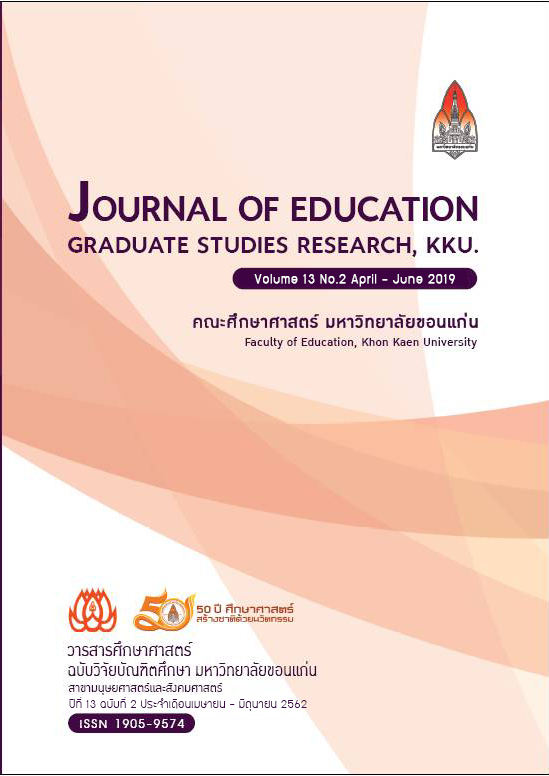The Development of a guideline management of learning the philosophy of sufficiency economy in schools the Office in the Secondary Education Service Area 21
Main Article Content
Abstract
This research purposes were: 1) To study the needs of teachers in learning management according to the philosophy of sufficiency economy in schools the Office in the Secondary Education Service Area 21 2) To develop a guideline management of learning the philosophy of sufficiency economy in schools the Office in the Secondary Education Service Area 21 that divided into 2 phases, consisting of phase 1: To study current conditions desirable condition of teachers in learning management according to the philosophy of sufficiency economy in schools the Office in the Secondary Education Service Area 21. The sample consisted of the 438 administrators and teachers. They were selected through stratified random sampling Phase 2: To study a guideline management of learning the philosophy of sufficiency economy in schools that there are 3 schools gave the information about best practice. 5 experts, evaluated the appropriateness and feasibility tools for data collection using questionnaires, interview forms. The mean, percentage, standard deviation, Pierson’s simple correlation coefficient, Cronbach’s Alpha coefficient, modified priority needs index: PNI and content analysis were used in data analysis.
The research results were as followed:
- The current condition of teachers in learning management according to the philosophy of sufficiency economy in schools the Office in the Secondary Education Service Area 21 was at a medium level and the desirable condition of teachers in learning management according to the philosophy of sufficiency economy in schools the Office in the Secondary Education Service Area 21 was at the best level.
- There are 4 guideline managements of learning the philosophy of sufficiency economy in schools the Office in the Secondary Education Service Area 21: 1) The unit according to the philosophy of sufficiency economy, there are 8 indicators. 2) The Integration of the philosophy of sufficiency economy, there are 8 indicators. 3) The evaluation of learning management according to the philosophy of sufficiency economy there are 6 indicators. 4) The media and learning resources of sufficiency economy, there are 8 indicators. The result of study a guideline management of learning the philosophy of sufficiency economy in schools the Office in the Secondary Education Service Area 21 found that the suitability and feasibility were at a good level.
Article Details
References
จิราพร ผุยผง. (2560). การพัฒนาแนวทางการบริหารจัดการหลักสูตรและการจัดกิจกรรมการเรียนรู้ตามหลักปรัชญาของเศรษฐกิจพอเพียงสำหรับโรงเรียนเรียนสังกัดสำนักงานเขตพื้นที่การศึกษามัธยมศึกษา เขต 22. วิทยานิพนธ์ปริญญาการศึกษามหาบัณฑิต สาขาวิชาการบริหารและพัฒนาการศึกษา บัณฑิตวิทยาลัย มหาวิทยาลัยมหาสารคาม.
จิรายุ อิศรางกูร ณ อยุธยา และปรียานุช พิบูลสราวุธ. (2553). ตามรอยพ่อ ชีวิตพอเพียง สู่การพัฒนาที่ยั่งยืน. กรุงเทพฯ: ศูนย์การพิมพ์เพชรรุ่งจำกัด.
เชาวเรศ ใจทัศ. (2559). การพัฒนาแนวทางการจัดการเรียนการสอนโดยใช้หลักปรัชญาของเศรษฐกิจพอเพียงสำหรับสถานศึกษา สังกัดสำนักงานเขตพื้นที่การศึกษาประถมศึกษามุกดาหาร. วิทยานิพนธ์ปริญญาการศึกษามหาบัณฑิต สาขาวิชาการบริหารการศึกษา บัณฑิตวิทยาลัย มหาวิทยาลัยมหาสารคาม.
ทรงศักดิ์ โฉมเฉลา. (2557). การศึกษาสภาพการจัดการเรียนรู้และบริหารการสถานศึกษาตามหลักปรัชญาของ เศรษฐกิจพอเพียงของสถานศึกษา สำนักงานเขตพื้นที่การศึกษามัธยมศึกษา เขต 26. วิทยานิพนธ์ปริญญา ครุศาสตรมหาบัณฑิต สาขาวิชาการบริหารการศึกษา บัณฑิตวิทยาลัย มหาวิทยาลัยราชภัฏมหาสารคาม.
ทิศนา แขมมณี. (2559). ถอดรหัสปรัชญาเศรษฐกิจพอเพียงสู่การสอนกระบวนการคิด. กรุงเทพฯ: โรงพิมพ์แห่งจุฬาลงกรณ์มหาวิทยาลัย.
รุ่งฤดี โชติวิเชียร. (2558). รูปแบบการจัดการศึกษาตามแนวปรัชญาของเศรษฐกิจพอเพียงในสถานศึกษา สังกัดสำนักงานเขตพื้นที่การศึกษาประถมศึกษากาฬสินธุ์ เขต 1. วิทยานิพนธ์ปริญญาการศึกษามหาบัณฑิต สาขาวิชาการบริหารการศึกษา บัณฑิตวิทยาลัย มหาวิทยาลัยมหาสารคาม.
สำนักงานเขตพื้นที่การศึกษามัธยมศึกษา เขต 21. (2560). แนวทางการดำเนินงานโครงการสถานศึกษาเศรษฐกิจพอเพียง. เอกสารประกอบการประชุมวิชาการแนวทางการดำเนินงานโครงการสถานศึกษาเศรษฐกิจพอเพียง, หนองคาย.
สำนักงานเลขาธิการสภาการศึกษา. (2560). แผนการศึกษาแห่งชาติ พ.ศ.2560-2579. กรุงเทพฯ: กระทรวงศึกษาธิการ.

